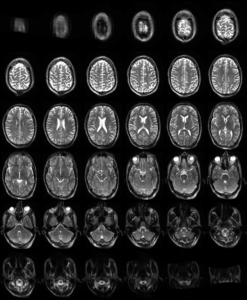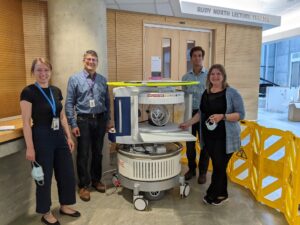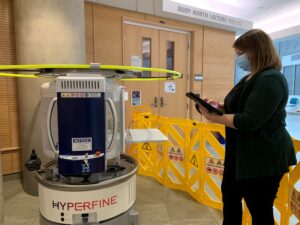When patients need to get an imaging test, such as magnetic resonance imaging (MRI), it can often be expensive, have long wait times and be inaccessible to those in remote locations. What if there was a cheaper, quicker and more convenient solution?
Dr. Shannon Kolind, a researcher at the Djavad Mowafaghian Centre for Brain Health and associate professor in the Department of Medicine at UBC, recently received one of the first Hyperfine portable MRI systems in Canada and will be investigating possible uses in research and clinical settings.
Hyperfine is a company that has developed the world’s first portable, easy-to-use MRI system. As part of a research project funded by the Bill and Melinda Gates Foundation, Dr. Kolind’s team and its partner site in sub-Saharan Africa or India will each receive a portable MRI from Hyperfine. Together, they will explore how the scanner can be used in low- and middle-income countries, with a particular interest in the effect of malnutrition on brain development in paediatric populations.
“The amazing thing about the scanner is you can take it to the patient,” says Dr. Kolind, “For example, one of the immediate applications that has come out of the pandemic is if you need to check whether a COVID patient had a stroke and they couldn’t make it to the MRI, the portable scanner would allow you do that at bedside.”
The scanner uses a very low magnetic field (64mT) compared to traditional research MRI scanners (which typically have 3T magnets) and clinical scanners (which usually have 1.5T magnets).
“Because of advances in technology, with better coils and tricks done in machine learning, it is still able to produce excellent images,” Dr. Kolind explains, “While the portable scanner is not meant to be a replacement for regular MRIs, it will be very useful as a complementary screening tool.”

Sample brain scan from the Hyperfine
To date, a main application of the Hyperfine scanner has been for stroke but funding from Brain Canada and Michael Smith Health Research BC will allow Dr. Kolind, PhD student Adam Dvorak and postdoctoral fellow Dr. Hanwen (Kevin) Liu to study its usage in multiple sclerosis (MS). The Kolind lab has also been working on improving myelin imaging techniques, which will be directly translatable onto the portable scanner and open up possibilities for data to be used in different scenarios and across different populations.
“It’s a lot of fun, as the physics are different and we spend so much time at these higher magnetic field strengths, we take it for granted,” says Dr. Kolind, “So having to rethink how to approach things at low field gets you thinking about MRI physics from the basics again, which I really enjoy.”
MRI is essential in MS care for diagnosis, detection of new brain lesions, monitoring disease progression, guiding treatment decisions and for use in clinical trials of new drugs. One of the main applications of this portable scanner for MS will be in remote communities and for those with mobility issues. Some patients may have disabilities associated with MS which restrict movement, while others may have metal implants inside their body, which make traditional MRIs with higher magnetic fields unsafe.
While the scanner is convenient for patients in hospital operating and emergency rooms, the bigger application will be in remote communities and cultures that do not have access to these tools. Currently, the portable scanner is for the head only, but uses for other areas of the body are under development and future design modifications will further expand its usability.
For Dr. Kolind’s team, the long-term goal is to provide improved patient access to MRI to enable faster diagnosis and better disease management.
“This technology democratizes access to care and really evens the playing field so that more people can get proper treatment,” Dr. Kolind notes. “I think it’s important that our tools are accessible to everyone in the community, so it’s really rewarding to work on something that can really help make a difference in people’s lives.”

Pictured from L-R: Laura Barlow, Dr. Anthony Traboulsee, Adam Dvorak and Dr. Shannon Kolind.

Dr. Kolind tests out the Hyperfine scanner in the atrium of the DMCBH.


